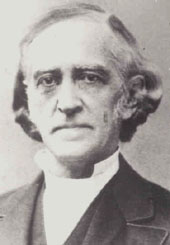
James Shrigley (April 5, 1813-July 24, 1905) was a Universalist minister, a United States Army chaplain during the Civil War, a leader in the Pennsylvania Universalist Convention; a supporter of the Murray Grove site (at Good Luck, New Jersey), a librarian, and a historian.
He was born in Delph, Yorkshire, England, the fifth of nine children born to John and Mary (Shaw) Shrigley. In 1821 the family moved to the United States and settled in Putney, Vermont. James’s parents had belonged to the Church of England and he had been christened in the Anglican Church outside of Delph. Because of the excesses and abuses they perceived in the Anglican Church, the family had soon after joined the reformist Methodists in Delph. The Shrigleys held a pew in the Methodist Church of Putney, Vermont. James’s writings indicate that even as a young boy he was troubled by the church’s belief that salvation was not available to all people. He begged his mother to go with him to hear a Universalist minister when he came to Putney.
James, who had shown the most academic promise of the Shrigley children, was sent to an academy in nearby Brattleboro. When the family’s fortune turned, however, he was called home and apprenticed to a cabinetmaker. When he was free from his obligation, he decided to follow a career in the Universalist ministry. Years later he said, “This faith came to me in my earliest years intuitively. I did not inherit it, nor did I receive it from the writings of men—God must have given it to me, and I have tried to be faithful to the trust.” He started his religious training in Dana, Massachusetts, and later studied under John H. Willis at Stafford, Connecticut. He was ordained in 1835 at his first church settlement, in North Granby, Connecticut.
Shrigley served churches in Exeter, New Hampshire, 1838-39; Baltimore, Maryland, 1841-48; Reading, Pennsylvania, 1850-54 and 1856-58; Philadelphia, Pennsylvania, 1854-56; and Richmond, Virginia, 1858-61. While he served in Baltimore he met and in 1842 married Mary Elizabeth Myers. The Shrigleys had four sons, one of whom died young.
In his early years Shrigley was friends with Horace Greeley. While in Reading he invited Greeley to speak in order to raise money for the Sunday school. A Reading attorney wrote Greeley, saying that there were many people who wished to hear him speak but had conscientious scruples against going to the Universalist Church. He asked if Greeley to speak in some other place on the evening preceding. Greeley replied, “I shall deliver only one lecture in Reading, and if there are those who desire to hear me but will not go to the Universalist Church, they are the people I cannot accommodate, as I have always found it to be useless to cast my pearls before swine.”
In 1858 Shrigley moved his family to Richmond, Virginia, having accepted a call from the Independent Christian Church. Preaching both for abolition of slavery and preservation of the Union, he was a powerful voice, but one of limited popularity—certainly outside his church. When the Virginia legislature voted to secede from the Union in 1861, he and his family quickly departed for the North.
In Philadelphia Shrigley served local churches and ministered to war wounded. After he had applied for Chaplaincy in the United States Army, a group of Protestant ministers traveled to Washington hoping to dissuade President Abraham Lincoln from making the appointment. The President asked on what grounds they were opposed to Shrigley. They replied that Shrigley believed in the salvation of all souls, and that even the rebels would be saved! Lincoln’s response was that, if that be so, the Reverend Mr. Shrigley deserved to be a Chaplain in the U. S. Army. Shrigley served at the McClellan Army Hospital in Philadelphia until 1865.
Following the war Shrigley was a supply pastor in and around Philadelphia. He held various offices with the Pennsylvania Universalist Convention, including secretary and historian. He was Librarian of the Pennsylvania Historical Society.
Shrigley spoke, as a historian, in 1882 at the Reading church’s 50th Anniversary and in 1891 and 1892 when the old building was torn down and at the first service held in the new building. He was instrumental in obtaining much of the pulpit furniture, still in use today. Using the cabinet-making skills he had acquired in his youth, he fashioned the letters of the words “In His Name” on the Communion table from wood he had collected at the Ephrata Cloister, an 18th Century celibate community founded by Conrad Beisel in nearby Ephrata, Pennsylvania; from the George de Benneville home in the nearby Oley Valley; and from the Thomas Potter home in what is now Murray Grove, New Jersey.
Death
In 1903 Shrigley was honored with a Doctorate from Tufts College. Before he died he was, for a number of years, the oldest living Universalist minister. His wife, Mary, died a few months after he did. They are buried in the Laurel Hill Cemetery in Philadelphia.
Sources
Shrigley’s family genealogy and papers are in the possession of Phillip W. Shrigley, the great-great grandson of James Shrigley, living in Lakewood, Colorado. Shrigley was an inveterate keeper of scrapbooks, letters, sermons. Other information may be obtained from the records of the First Unitarian Universalist Church of Berks County, Reading, Pennsylvania; the Pennsylvania Universalist Convention; and the Murray Grove Association, Lanoka Harbor, New Jersey. In addition, references to the Shrigley are found in: the Universalist Register, 1906; the Reading Eagle, Reading, Pennsylvania, and Philadelphia newspapers; the holdings of the Berks County Historical Society, Reading, Pennsylvania; and the Pennsylvania Historical Society, Philadelphia, Pennsylvania.
Article by Nelson C. Simonson
Posted August 15, 2005